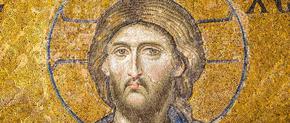The views expressed in our content reflect individual perspectives and do not represent the authoritative views of the Baha'i Faith.
At a period that feels particularly dark for humanity, what does it mean to “live in the spirit” and how does this help us be happy?
To try to answer this question – at least in part – I produced a podcast for several years on humanity’s spiritual heritage, which is now a website at www.thesoulsalons.com. It examines the work of prophets, poets, mystics, and philosophers throughout the ages whose teachings have focused on our divine, or sacred, reality. This quotation from a talk Abdu’l-Baha gave in Paris inspired me:
As for the spiritual perfections they are man’s birthright and belong to him alone of all creation. Man is, in reality, a spiritual being, and only when he lives in the spirit is he truly happy.
RELATED: Learning the Spiritual Ethics of Love and Unity
The series centers around what I call “divine philosophy,” or a focus on the phenomena of the spirit versus the phenomena of material reality. It also honors the work of Dr. Suheil Bushrui, former Baha’i Chair for World Peace at the University of Maryland. Professor Bushrui wrote and lectured on the wider spiritual heritage of the human race. In Retrieving Our Spiritual Heritage, he said:
We inhabit a world that is ‘running scared’ from its spiritual roots, in which we seek to hide our emptiness behind the bleak walls of materialism. Yet we can never escape from what is so inextricably a part of our nature. However deeply buried, however sorely burdened, however grievously neglected, the human spirit can never be entirely stifled, eclipsed or overwhelmed.
Looking over the 40 podcast episodes I’ve completed, it seems clear that humanity has been given consistent spiritual guidance over the centuries. However, maybe we humans need to be constantly repeated by major and minor prophets because we keep losing the thread, so to speak. As one example, the “Seven Deadly Sins” mentioned in the Bible – including keeping a lid on detrimental qualities like greed, pride, and anger – were brought up by many different spiritual teachers throughout the ages. I was inspired, too, by how much one tradition built on others, like the Zoroastrian faith’s impact on Greek and Roman philosophers as well as very specific stories in the Bible.
There are too many common themes to recount here, but I will focus in this article on the search for a beloved and our purpose in this world.
Our Search for the Beloved
Several of the episodes – especially from the mystical traditions of Islam and the Baha’i Faith – feature the ongoing search for the “Beloved,” however one defines that entity. I’ve always felt that we come from a time that our souls once knew – and that our lives require a struggle to get back to that place. We have a “homesickness for God” as one reference aptly described it.
This search for the beloved certainly comes up in the writings of Rumi, a well-known Sufi mystic and poet who lived in the 13th century. In the Masnavi, one of his most famous works, he talked about this search being the underlying motivation for God’s creation:
Lovers of perfection, every atom
Turns sapling-like to face the sun and grow
Their haste to shed their fleshly form for soul
Sings out an orison of praise to God.
In the beginning of St. Augustine’s Confessions, which was essentially an autobiography about his long journey toward faith, he said something similar: “Thou awakest us to delight in Thy praise; for Thou madest us for Thyself, and our heart is restless, until it repose in Thee.”
From the Baha’i Faith, Baha’u’llah’s mystical book The Hidden Words also speaks about this search, but from God’s perspective: “O Son of Man! I loved thy creation, hence I created thee. Wherefore do thou love Me, that I may name thy name and fill thy soul with the spirit of life.”
These passages reminded me of a 1980 song by country western singer named Johnny Lee that says we are “looking for love in all the wrong places.” What we seek may actually be closer to us than our life-vein, as the Baha’i writings and many other spiritual traditions point out.
Searching for Our True Purpose
Searching for our true purpose is a related theme that came up repeatedly in the Soul Salons. What does finding our “true” purpose mean if we accept that our reality is not just this physical one, but a spiritual reality that is, at least for the moment, largely veiled from us? Most wisdom teachers featured in the podcasts expressed the pushes and pulls of these opposing forces. They often pointed out that we have focused so heavily on materialism that we have, essentially, forgotten our spiritual side.
The ups and downs of this whole process was recognized in one of the Sikh scriptures called the Sukhmani:
At times we are noble, at times we are base,
Now we suffer in pain, now we laugh in joy,
We slander and we worry,
We rise sky high, we sink to the underworld,
But at times we are enlightened, and contemplate the Transcendent.
Abdu’l-Baha, a central figure in the Baha’i Faith, often spoke about different levels of spirit including the animal, human, heavenly, and holy. In a talk he gave in Montreal in 1912, he said:
The breaths of the Holy Spirit have been wafted through the gardens of human hearts, the doors of the divine Kingdom opened to mankind and the invisible inspirations sent forth from on high. This divine and ideal power has been bestowed upon man in order that he may purify himself from the imperfections of nature and uplift his soul to the realm of might and power.
RELATED: How Do I Know the Right Thing to Do?
But some choose not to go very far in this spiritual journey, said Catholicism’s St. Teresa of Avila. In her work called The Interior Castle, she chronicled the journey of the soul by using the metaphor of a castle’s seven different chambers, or mansions:
Many souls live in the courtyard of the building where the sentinels stand, neither caring to enter farther, nor to know who dwells in that most delightful place, what is in it and what rooms it contains.
Throughout the work, St. Teresa comments on the self-love that can block a seeker’s path along this seven-stage journey.
Some of what I enjoyed most about doing the research for The Soul Salons was learning about the lives of many great teachers. Often it wasn’t a founder of a world religion, but someone in touch with the divine in some way who was just trying to understand the “why” of it all. Often, these individuals had a lot of their own struggles. That humanized the whole thing for me, helping me realize that this life is meant to be a school whose lessons aren’t always easy.
Here’s a moving passage along these lines that I will close with from a Bengali poet, artist, and spiritual philosopher named Rabindranath Tagore:
The song that I came to sing remains unsung to this day.
I have spent my days in stringing and in unstringing my instrument.
The time has not come true, the words have not been rightly set; only there is the agony of wishing in my heart.
The blossom has not opened, only the wind is sighing by.
I have not seen his face, nor have I listened to his voice; only I have heard his gentle footsteps from the road before my house.
Note: Insights from the above-noted wisdom teachers are highlighted in 12 minute audio files at www.thesoulsalons.com.
















Comments
Sign in or create an account
Continue with Googleor